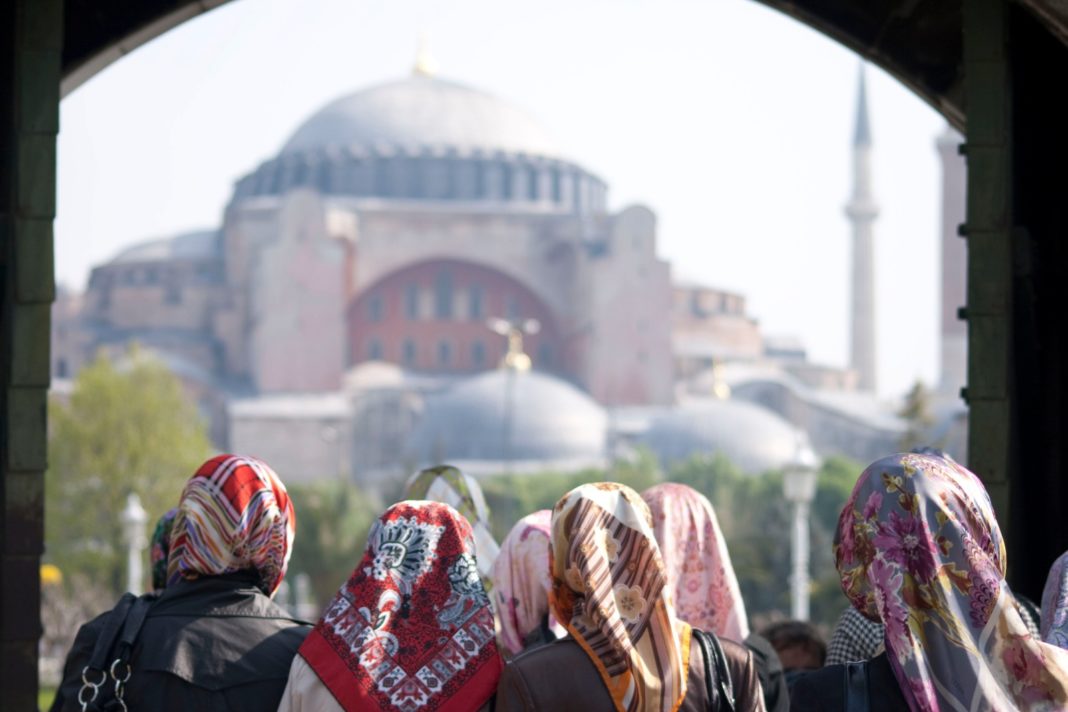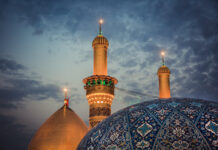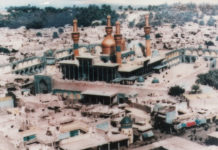The following is a loose translation of an excerpt from Zan dar Ayīnih-yi Jalāl wa Jamāl [Women in the Mirror of Divine Beauty and Glory], a compilation of lectures by Ayatullah Jawadi Amuli on the status of women in the Islamic tradition. Ayatullah Jawadi Amuli is a student of the renowned exegete, Allamah Muhammad Husayn Tabataba’i (d. 1981), and one of today’s most prominent and influential scholars in Qum. He has authored dozens of books on a wide variety of topics, ranging from jurisprudence to history and tafsir literature. Ayatullah Jawadi’s Qurʾanic hermeneutics, like that of his teacher Allamah Tabataba’i, focuses on using the Qurʾan as the primary source for Qurʾanic exegesis. As will be clear from the following excerpt, he primarily uses the Qurʾan to explain the status of these women in the Islamic tradition, and offers an important contemporary view on the status of women in the Islamic tradition.
Please note that the original chapter has been condensed for brevity and clarity, along with some rewording and added clarification.
Women in the Qurʾan
Whenever Allah senses a dangerous trend in society, He counteracts it in the Qurʾan and reaffirms the divine position. For example, when the Qurʾan was being revealed, tawḥīd itself was in danger, and polytheism rampant. Therefore, numerous verses were revealed in establishing tawḥīd and condemning shirk. Additionally, during the period of revelation, the status and sanctity of women were entirely unprotected. Pushing against this norm, the Qurʾan emphasizes the sanctity of women and declares that she has a share at all levels of existence.[1]Here, the author is alluding to the fact that the Qurʾan establishes that women have both rights and roles differing from what was allocated to her at the time of the revelation of the Qurʾan. For example, her share of inheritance is established and protected, even if it might not be equal to that of a man. In cases where women were ignored, the Qurʾan ensured that she was not neglected and that her rights and share were recognized. And it explicitly states that men and women are completely equal in their essential humanity.
The Qurʾan also narrates several insightful stories wherein women play a primary role. And when identifying both beautiful and repulsive behavior, it refers to both praiseworthy men and exemplary women.
Qurʾanic Role-Models
In numerous verses of the Qurʾan, Allah identifies the Prophet as a mercy to all the world. These verses include:
We did not send you but as a mercy to all the nations.
[Sūrah Al-Anbiyāʾ, 21:107]
We did not send you except as a bearer of good news and warner to all mankind
[Sūrah al-Sabaʾ, 34:28]
God also describes the Prophet (s) as a role model—as the best of examples:
There is certainly a good exemplar for you in the Apostle of Allah
[Sūrah al-Aḥzāb, 33:21]
The first set of verses declare clearly that the Prophet (s) was sent to the entire world, which of course, encompasses both men and women. When taken with the second verse from Sūrah al-Aḥzāb, which describes the Prophet (s) as an exemplar, we see that the “for you” [لكم] in the verse does not exclusively refer to men, even though it uses the masculine pronoun. In fact, although pronouns are gendered in Classical Arabic, the masculine does not necessarily exclude women. Rather, the masculine is often used to be inclusive of women.
The Qurʾan speaks dialogically and conversationally. As such, when someone says, ‘Oh men!’ in Arabic, it does not mean men in contrast to women. Rather, it is an expression that is inclusive of both genders, meaning people in general. And if the Prophet (s) is—as the Qurʾan says—“a mercy to all of humanity”, and “a warner to all of humanity,” then the Prophet (s) cannot be an example exclusively for men. Rather, he is an example for all: both men and women.
Pious human beings of both genders can be role-models and examples for all people, not just members of their own gender. In the Qurʾan, Allah identifies four examples of women: two good and two bad. These Qurʾanic examples of women, whether good or bad, are not examples exclusively for women; rather, they are female examples. Furthermore, good or bad men are not examples for men; rather, they are male examples. This is an important distinction. In the Qurʾan, exemplary men and women are examples of good human beings, and corrupt men and women are examples of the corrupt.
With this in mind, we will now explore examples of women in the Qurʾan who are truly exemplary—for both men and women.
- Sarah Converses with Angels
The wife of Ibrahim, khalīl Allāh (the friend of God), known most famously as Sarah, is an exemplary woman who spoke with angels. In addition to Prophet Ibrahim, she also received the angel’s glad tidings and the message from the Divine. As we will soon see, the Qurʾan describes Sarah and Ibrahim’s reception of the glad tidings in exactly the same way:
So We gave him the good news of a forbearing son.
[Sūrah al-Ṣāffāt, 37:101]
He said, ‘Do you give me good news though old age has befallen me?
What is the good news that you bring me?’
[Sūrah al-Ḥijr, 15:54]
Note that Prophet Ibrahim’s remarks here were not from distrust [istibʿād], but from amazement and wonder [istiʿjāb]. Here, he says “When I have reached old age, you have come to give me good news? So what is this good news that you bring me?” The angels respond:
“We bring you good news in truth; so do not be among the despondent!”
[Sūrah al-Ḥijr, 15:55]
The angels tell Prophet Ibrahim: Do not despair or lose hope, for the good news that we bring you is true; it is not outlandish and far-fetched.’ The particle “bāʾ” used here in “bi-l-ḥaqq”, means that the words of the angels were figuratively “clothed” in truth .
In response, Ibrahim says:
And who despairs from the Mercy of His Lord except the astray?
[Sūrah al-Ḥijr, 15:56]
Ibrahim is here essentially saying, ‘Not only do I not despair, but despair is antithetical to guidance, and cannot be entertained by Prophets or divine leaders.’ Despair here means thinking or supposing that God is unable to solve a problem—God forbid. This type of despair is a form of disbelief, and it is a sin to fall prey to it, especially for a Prophet.
In the Qurʾan, the same story has been narrated in Surah Hūd. In this surah, we see that Sarah, the wife of Ibrahim, is present and plays an important part in the story. Upon hearing the good news of their child, the following is narrated:
His wife, standing by, laughed as We gave her the good news of [the birth of] Isaac, and of Jacob, after Isaac.
[Sūrah Hūd, 11:71]
This verse states that when the angels conveyed this message to Ibrahim, Sarah was present, and did ḍiḥk. According to tafsir literature, the verb ḍaḥaka can mean one of two things: either literal elation and joy, or the beginning of one’s menstrual cycle.[2]Here, Ayatullah Jawadi Amuli references Allamah Tabarsī’s Majmāʾ al-Bayān, and Mullah Fayḍ al-Kāshānī’s Tafsīr al-Ṣāfī, under verse 71 of Sūrah Hūd. The verse then states that the angels gave glad tidings of Ishāq [Isaac], followed by Ishāq’s son Yaʿqūb [Jacob] and his descendants.
The conversation that Sarah has with the angels is as follows:
She said, ‘Oh, my! Shall I, an old woman, bear [children], and [while] this husband of mine is an old man?! That is indeed an odd thing!’ They said, ‘Are you amazed at Allah’s dispensation? [That is] Allah’s mercy and His blessings upon you, members of the household. Indeed He is all-laudable, all-glorious.’
[Sūrah Hūd, 11:72-73]
- The Mother and Sister of Prophet Musa
Many men have found fame through their ability to defend against oppression and through their rage against tyranny. However, in the resistance against the Pharaoh’s oppression, it is the women whose resistance stands out. The Qurʾan discusses three women who protected Prophet Musa and played an important role in raising him.
Prophet Musa, kalīm al-Allāh (the one who spoke to God)[3]In the Islamic tradition, Prophet Musa, known as Moses in the Biblical tradition, is known as kalīm-Allāh, which means the one who spoke to God. This refers to his conversations with the Lord at mount Sīnā. See Qurʾan 4:164, “And to Moses, Allah spoke directly.” , was raised jointly by his mother, his sister, and the wife of Pharaoh (known as Āsiyah in the Islamic tradition)[4]For more on Āsiyah, see Meghji, “A Woman of Paradise: The Rebellious Queen of Pharaoh” in Message of Thaqalayn 17:2 (Summer 2016). . Despite the tyranny of Pharaoh’s rule, these three women put their own lives at risk to protect Prophet Musa.
When describing how the mother of Prophet Musa followed the Divine command to place her child in the river, Allah says:
We revealed to Moses’ mother, [saying], ‘Nurse him; then, when you fear for him, cast him into the river, and do not fear or grieve, for We will restore him to you and make him one of the apostles.’
[Sūrah al-Qaṣaṣ, 28:7]
Afterwards, Musa’s mother speaks with his sister, telling her what to do next:
She said to his sister, ‘Follow him.’ So she watched him from a distance, while they were not aware.
[Sūrah al-Qaṣaṣ, 28:11]
Then Āsiyah, the wife of Pharaoh, is quoted as saying:
Pharaoh’s wife said [to him], ‘[This infant will be] a [source of] comfort to me and to you. Do not kill him. Maybe he will benefit us, or we will adopt him as a son.’ But they were not aware.
[Sūrah al-Qaṣaṣ, 28:9]
All three of these women are remembered for their role in facilitating Prophet Musa’s growth, which led to the eventual downfall of the Pharaoh’s tyrannical reign. Clearly, sending the cradle towards the Pharaoh’s palace was not an easy task. Prophet Musa’s mother instructed his sister to follow the cradle until it reached its destination. Once there, she was to note where it landed. And if it landed in the Pharaoh’s palace, she was to suggest Musa’s mother as a wet-nurse:
Since before We had forbidden him to be suckled by any nurse. So she said, ‘Shall I show you a household that will take care of him for you and they will be his well-wishers?’
[Sūrah al-Qaṣaṣ, 28:12]
This was also not an easy task: The entire reason that Prophet Musa was in danger was because Pharaoh was killing all the Israelites’ newborn boys. As such, every nursing woman was closely watched in order to see if they had given birth to a son or a daughter. Only women who had new-born children could produce milk, and as such, to recommend and identify someone as a wet-nurse was not mundane. It was a dangerous move, one faced with the possibility of death. This is why, Prophet Musa’s mother had given birth to him in complete secrecy—Pharaoh and his followers were trying to figure out the gender of every child so as to kill the new-born boys:
We relate to you truly some of the account of Moses and Pharaoh for a people who have faith.
[Sūrah al-Qaṣaṣ, 28:3]
As such, his mother’s instruction to pursue the cradle was precarious. And his sister’s bold recommendation was also a courageous act. Furthermore, Āsiyah’s suggestion to keep the child was not without risk, for she was recommending this to the most blood-thirsty man of the time, a man infamous for the murder of children. And even then, she told him:
Pharaoh’s wife said [to him], ‘[This infant will be] a [source of] comfort to me and to you. Do not kill him. Maybe he will benefit us, or we will adopt him as a son.’ But they were not aware.
[Sūrah al-Qaṣaṣ, 28:9]
Notes
| 1. | ⇧ | Here, the author is alluding to the fact that the Qurʾan establishes that women have both rights and roles differing from what was allocated to her at the time of the revelation of the Qurʾan. For example, her share of inheritance is established and protected, even if it might not be equal to that of a man. In cases where women were ignored, the Qurʾan ensured that she was not neglected and that her rights and share were recognized. |
| 2. | ⇧ | Here, Ayatullah Jawadi Amuli references Allamah Tabarsī’s Majmāʾ al-Bayān, and Mullah Fayḍ al-Kāshānī’s Tafsīr al-Ṣāfī, under verse 71 of Sūrah Hūd. |
| 3. | ⇧ | In the Islamic tradition, Prophet Musa, known as Moses in the Biblical tradition, is known as kalīm-Allāh, which means the one who spoke to God. This refers to his conversations with the Lord at mount Sīnā. See Qurʾan 4:164, “And to Moses, Allah spoke directly.” |
| 4. | ⇧ | For more on Āsiyah, see Meghji, “A Woman of Paradise: The Rebellious Queen of Pharaoh” in Message of Thaqalayn 17:2 (Summer 2016). |




